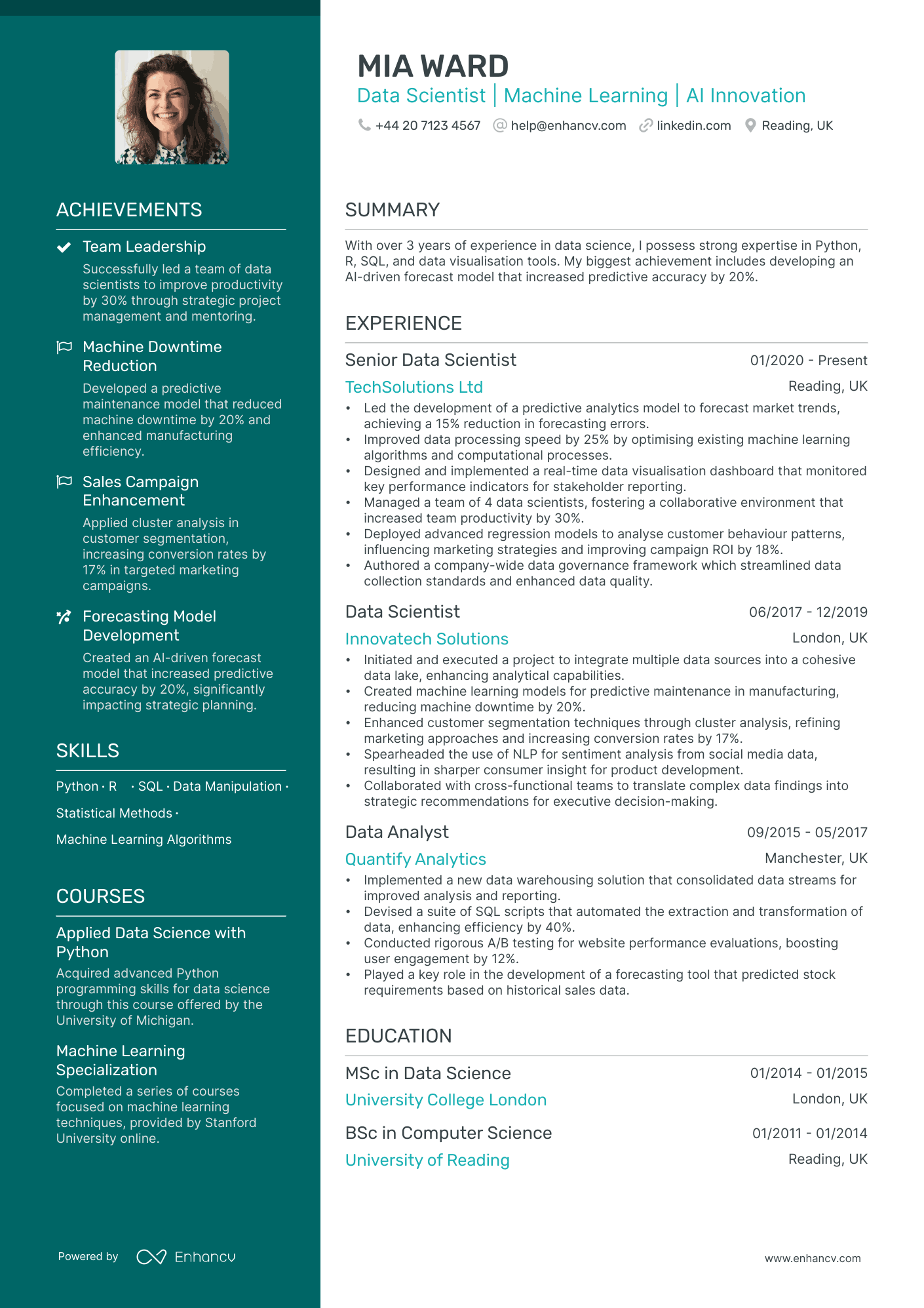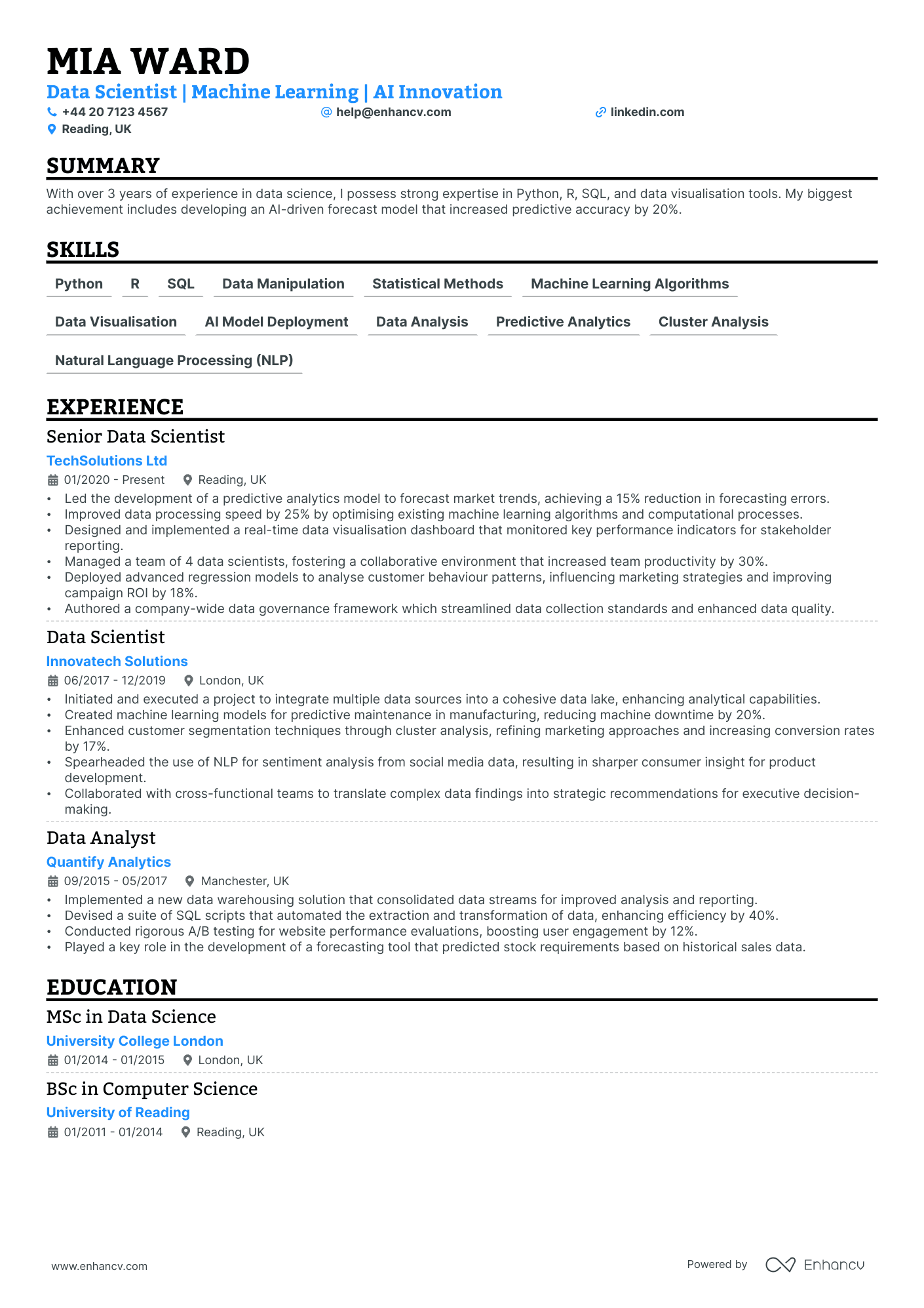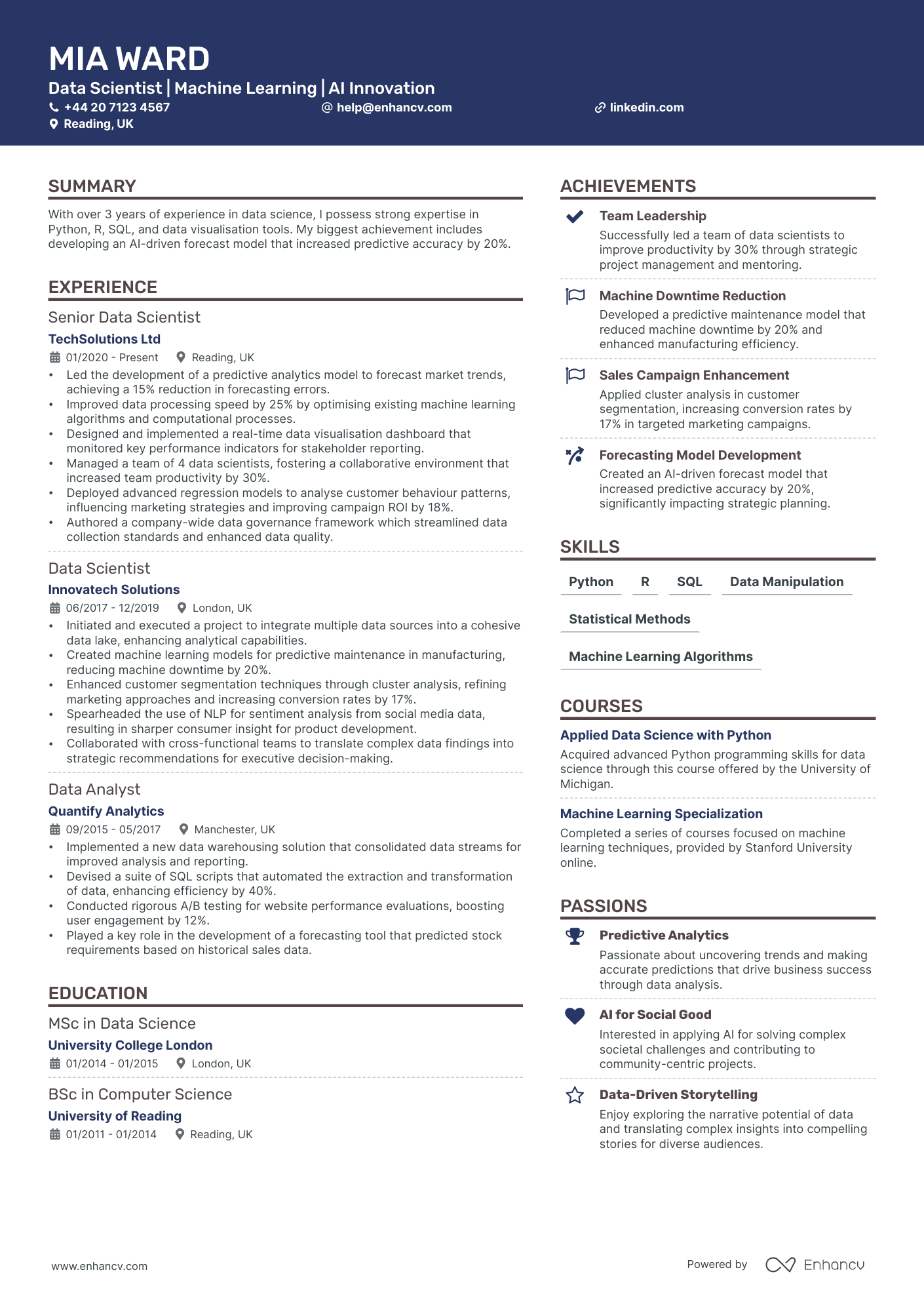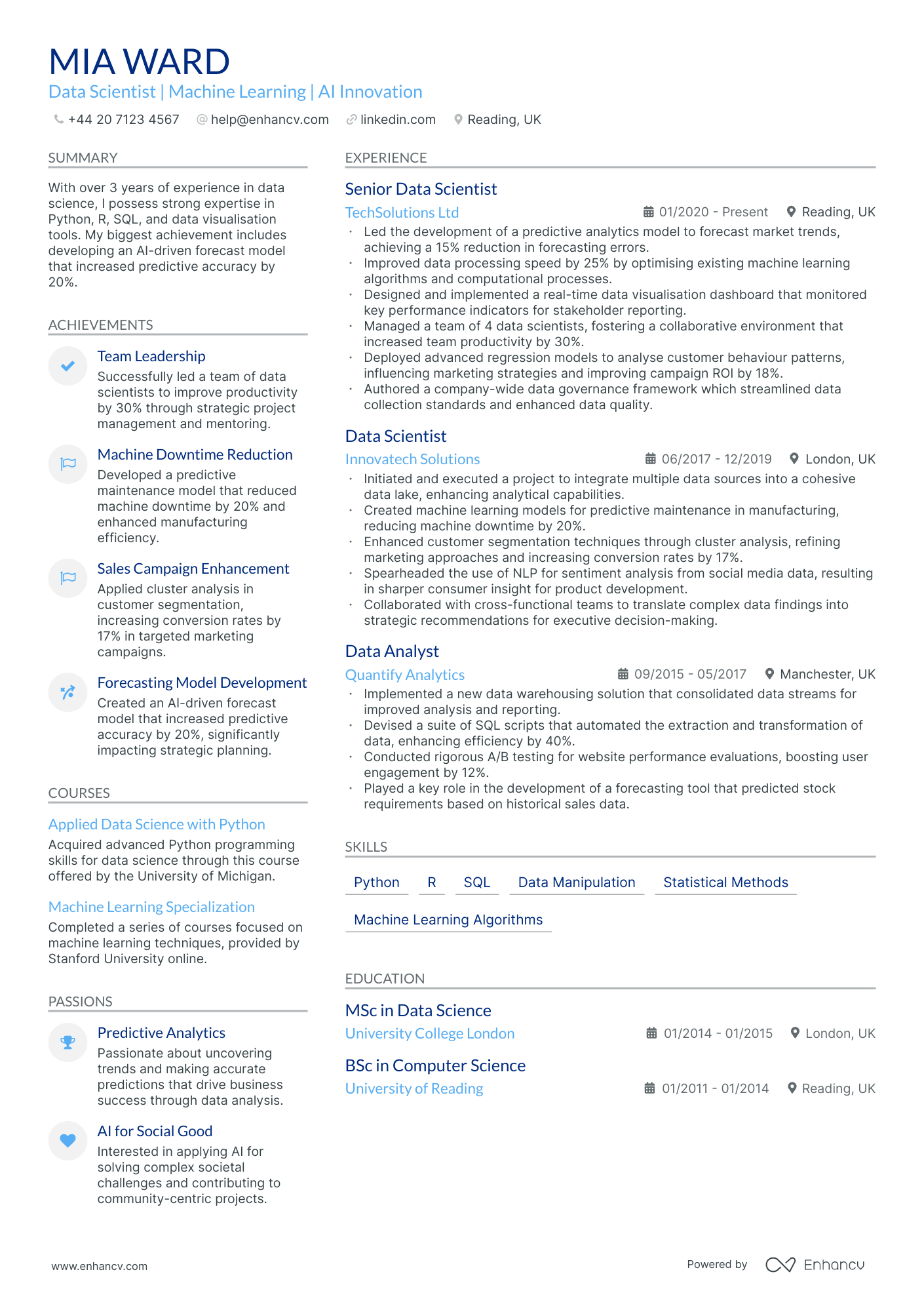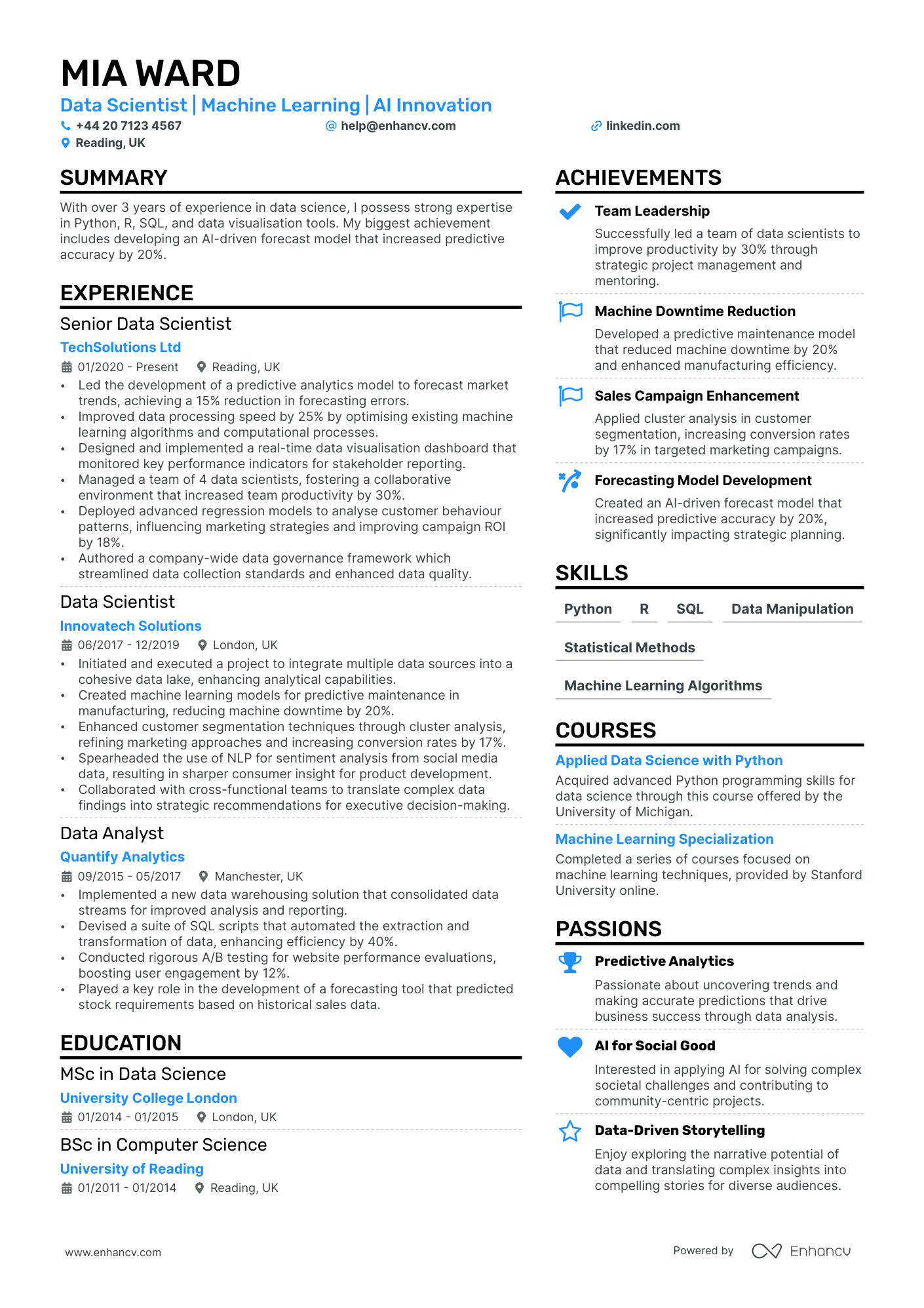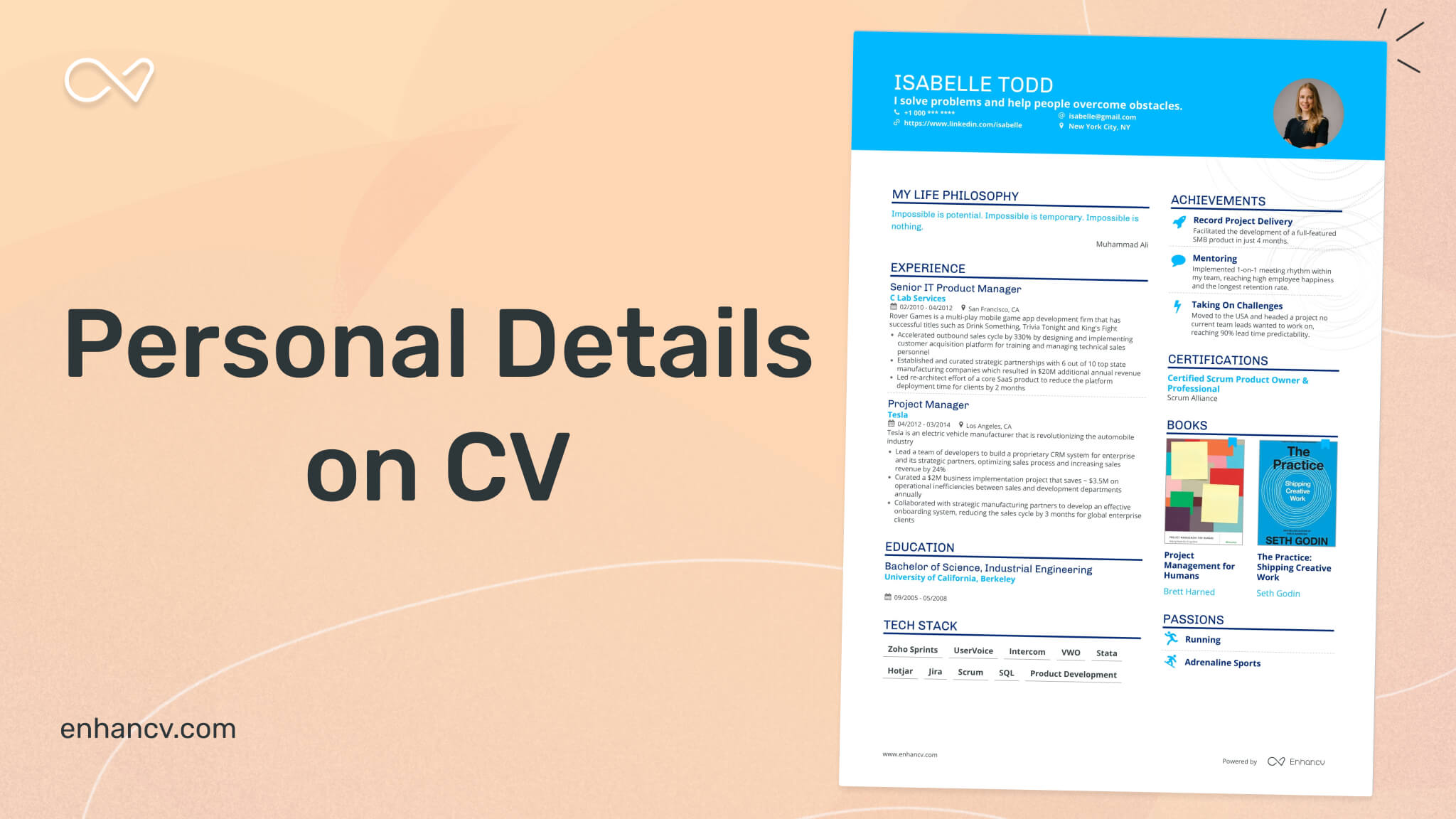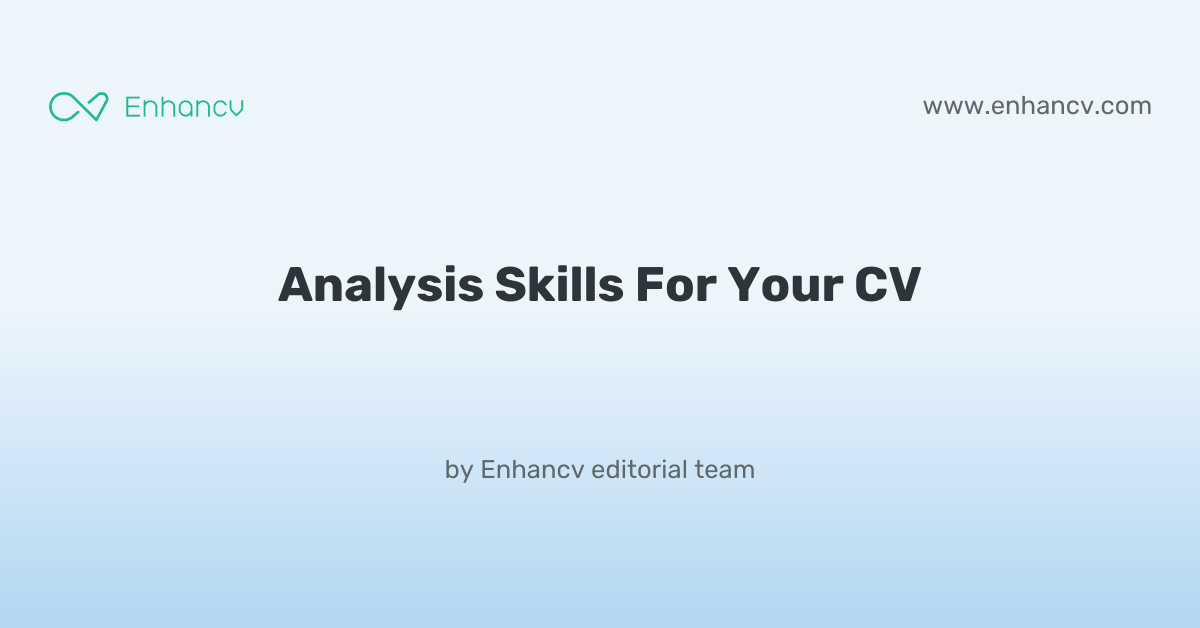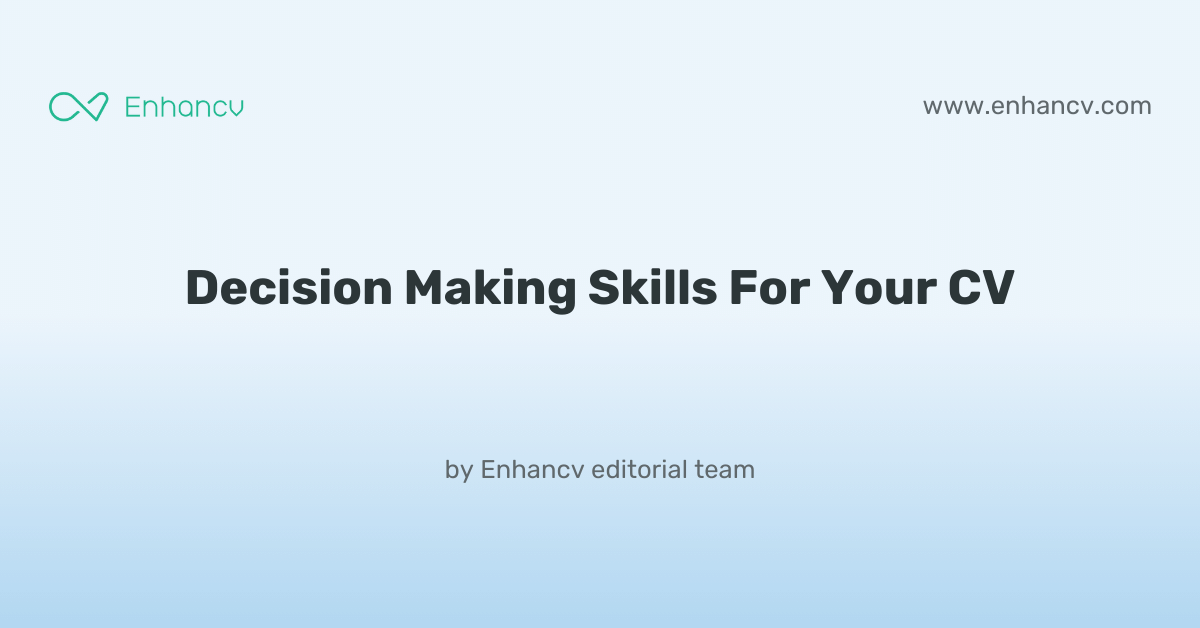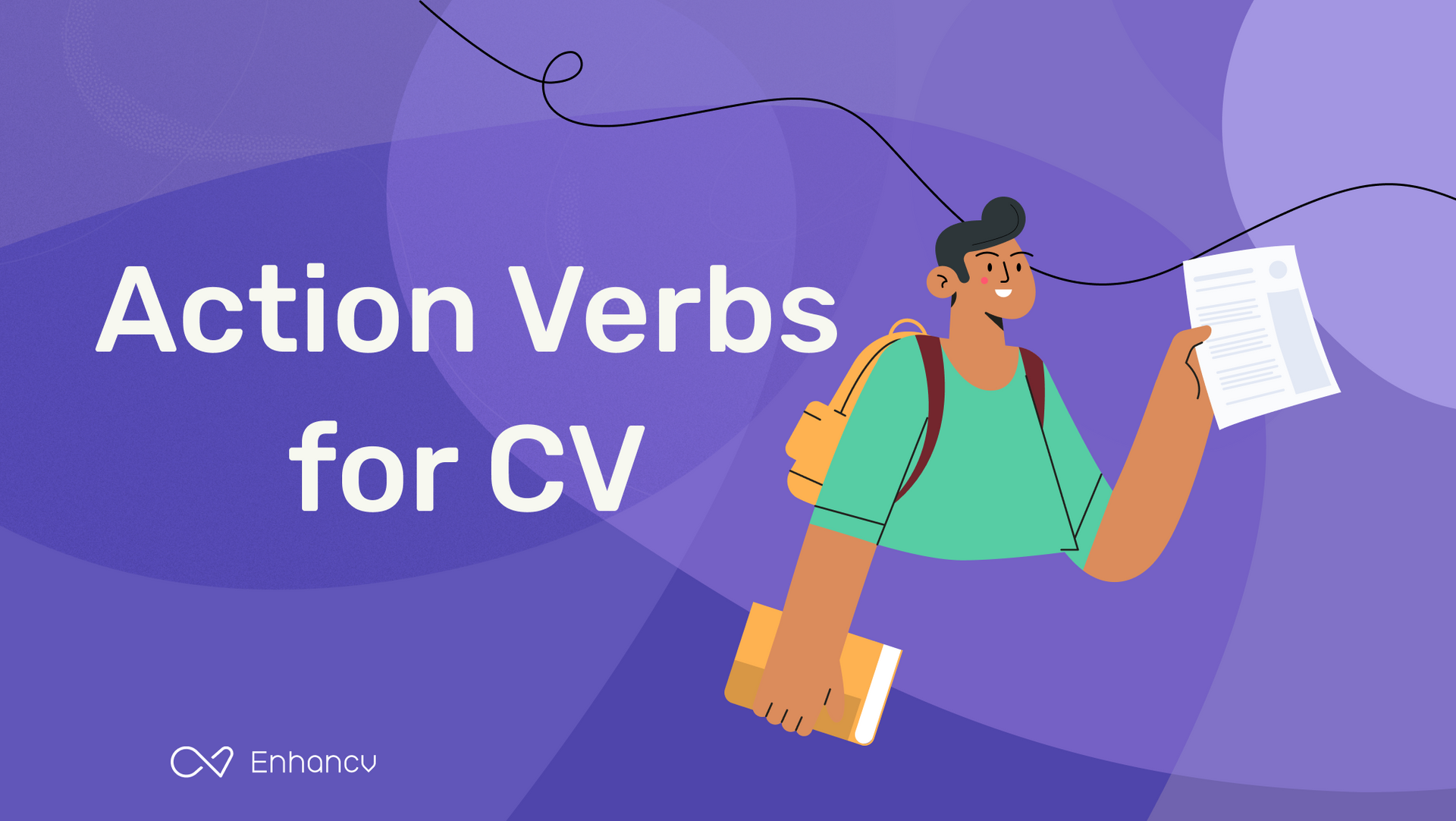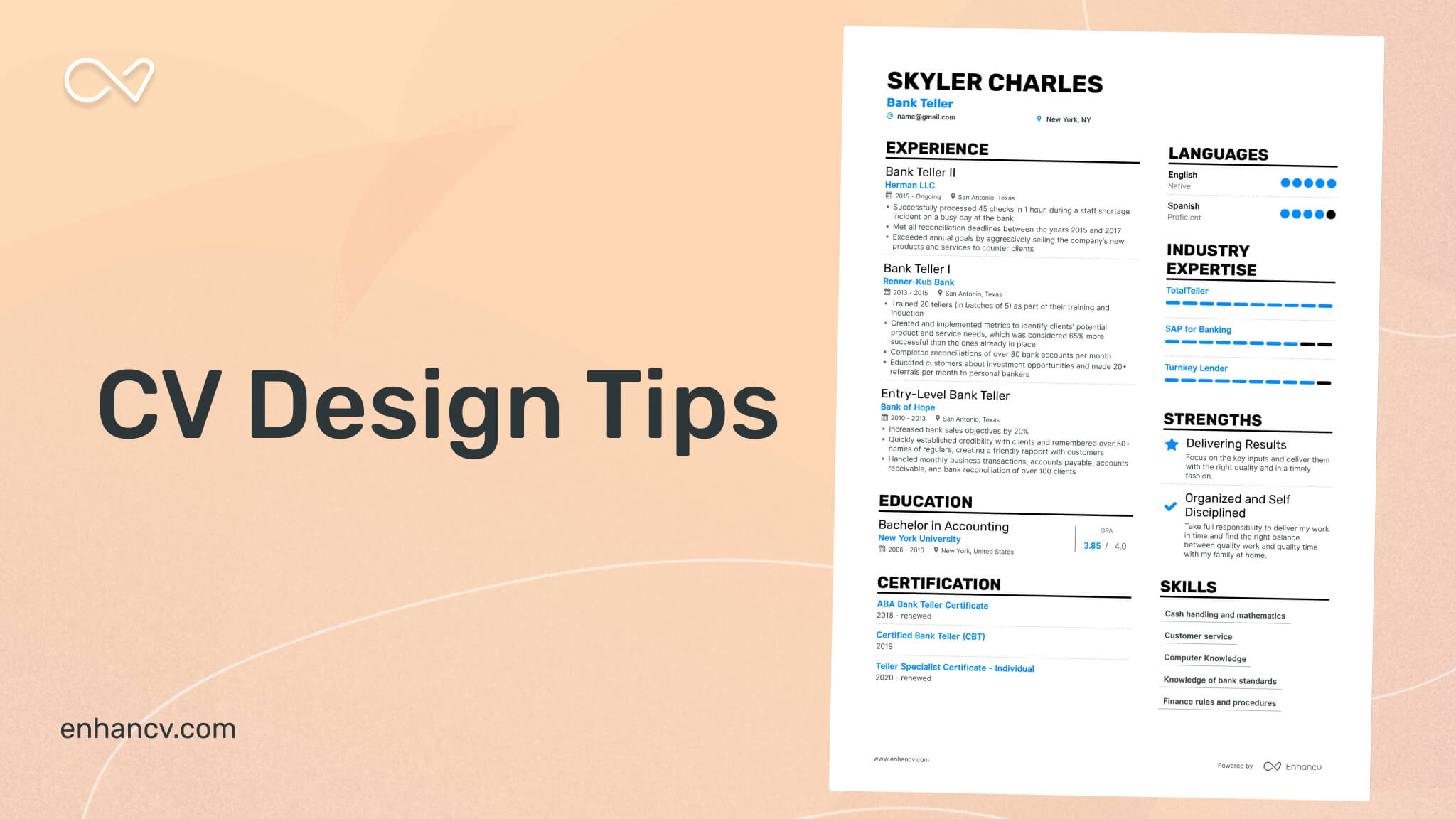One challenge you may encounter as a data scientist is ensuring your computer vision models are not biased towards any particular demographic group. Our comprehensive guide offers practical techniques and resources to help you implement fairness and mitigate bias in your AI systems.
- Create an attention-grabbing header that integrates keywords and includes all vital information;
- Add strong action verbs and skills in your experience section, and get inspired by real-world professionals;
- List your education and relevant certification to fill in the gaps in your career history;
- Integrate both hard and soft skills all through your CV.
Discover more industry-specific guides to help you apply for any role in the links below:
How complex should the format of your data scientist CV be?
Perhaps, you decided to use a fancy font and plenty of colours to ensure your data scientist CV stands out amongst the pile of other candidate profiles. Alas - this may confuse recruiters. By keeping your format simple and organising your information coherently, you'll ultimately make a better impression. What matters most is your experience, while your CV format should act as complementary thing by:- Presenting the information in a reverse chronological order with the most recent of your jobs first. This is done so that your career history stays organised and is aligned to the role;
- Making it easy for recruiters to get in touch with you by including your contact details in the CV header. Regarding the design of your CV header, include plenty of white space and icons to draw attention to your information. If you're applying for roles in the UK, don't include a photo, as this is considered a bad practice;
- Organising your most important CV sections with consistent colours, plenty of white space, and appropriate margins (2.54 cm). Remember that your CV design should always aim at legibility and to spotlight your key information;
- Writing no more than two pages of your relevant experience. For candidates who are just starting out in the field, we recommend to have an one-page CV.
One more thing about your CV format - you may be worried if your double column CV is Applicant Tracker System (ATS) complaint. In our recent study, we discovered that both single and double-column CVs are ATS-friendly . Most ATSes out there can also read all serif and sans serif fonts. We suggest you go with modern, yet simple, fonts (e.g. Rubik, Lato, Raleway) instead of the classic Times New Roman. You'll want your application to stand out, and many candidates still go for the classics. Finally, you'll have to export your CV. If you're wondering if you should select Doc or PDF, we always advise going with PDF. Your CV in PDF will stay intact and opens easily on every OS, including Mac OS.
PRO TIP
Use bold or italics sparingly to draw attention to key points, such as job titles, company names, or significant achievements. Overusing these formatting options can dilute their impact.
The top sections on a data scientist CV
- Technical Skills demonstrate the necessary tools and languages known.
- Professional Experience shows relevant past roles and achievements.
- Education and Certifications highlight formal training and specialisation.
- Projects and Portfolio offer a practical view of skills applied in real-world scenarios.
- Professional Development and Training underscore commitment to ongoing learning.
What recruiters value on your CV:
- Highlight your proficiency with data science tools and programming languages such as Python, R, SQL, and relevant frameworks or libraries; ensure you provide specifics about projects where you've applied these skills.
- Demonstrate your experience with machine learning algorithms and statistical techniques, detailing success metrics from projects where your models significantly improved outcomes.
- Showcase your ability to handle large datasets by mentioning experiences with data warehousing, ETL processes, and your competence in using big data technologies like Hadoop or Spark.
- Include examples of your data visualisation and communication skills, illustrating how you've translated complex results into understandable insights for various stakeholders.
- Exhibit your problem-solving capabilities by outlining scenarios where you've applied data science techniques to address real-world business problems, and the impacts of your solutions.
Recommended reads:
What information should you include in your data scientist CV header?
The CV header is potentially the section that recruiters would refer to the most, as it should include your:
- Contact details - your professional (non-work) email address and phone number;
- Professional photograph - if you're applying hinting at the value you bring as a professional.
Many professionals often struggle with writing their data scientist CV headline. That's why in the next section of this guide, we've curated examples of how you can optimise this space to pass any form of assessment.
Examples of good CV headlines for data scientist:
- Lead Data Scientist | Predictive Analytics & Machine Learning | PhD | Certified Data Professional | 10+ Years
- Senior Data Scientist | AI Deployment & Strategy | Big Data Expertise | MSc Statistics | 7 Years Exp.
- Data Scientist II | Bioinformatics & Genomics | Python & R Proficiency | 5+ Years' Experience
- Junior Data Scientist | Graduate Analyst Program | Data Visualisation & SQL | MEng | Entry-Level
- Data Science Manager | Team Leadership & Project Delivery | Advanced Analytics | PMP | 8 Years' Track Record
- Principal Data Scientist | Finance & Risk Modelling | Deep Learning Specialist | Ph.D. | 12 Years Experience
Catching recruiters' attention with your data scientist CV summary or objective
Located closer to the top of your CV, both the summary and objective are no more than five sentences long and serve as an introduction to your experience. What is more, you could use either to entice recruiters to read on. Select the:
- Summary, if you happen to have plenty of relevant experience. Feature your most impressive accomplishments and up to three skills that are relevant to the job you're applying for;
- Objective, if you're just starting your career off. Provide your career goals and answer how you see the role you are applying for will match your professional growth.
Judging which one you need to add to your data scientist CV may at times seem difficult. That’s why you need to check out how professionals, with similar to your experience, have written their summary or objective, in the examples below:
CV summaries for a data scientist job:
- With over 5 years of experience in leveraging data analytics and machine learning techniques, I have enhanced data-driven decision-making in a fast-paced fintech sector. Skilled in Python, R, SQL, and big data platforms, my crowning achievement includes deploying a predictive model that improved investment strategies by 20%.
- An adept data scientist with 7 years under my belt, I specialise in utilising AI to drive e-commerce growth. Proficient in Python, TensorFlow, and A/B testing, I led a cross-functional team to develop a recommendation engine that boosted average user spend by 30%, significantly outperforming benchmarks.
- Transitioning from a 10-year career in academia as a computational biologist, I am equipped with robust data analysis and statistical modelling expertise. Newly proficient in Python and SQL, I am eager to apply my track record of published peer-reviewed research to solve real-world data problems in a dynamic tech environment.
- After a successful career in financial analysis with expertise in Excel and VBA, I am now seeking to pivot my analytical skills towards data science. Having recently completed a specialised course in Python, data visualisation, and machine learning, I am ready to contribute meaningful insights in a more data-centric industry.
- Eager to embark on a data science journey, my fresh perspective is backed by a strong foundation in mathematics and statistics from my academic career. While I possess no direct experience, my recent certification in data analytics tools like Excel, Python, and Tableau has prepared me to deliver value through insightful data interpretation.
- As a recent graduate with a degree in computer science and a passion for data analytics, I aim to apply the theoretical knowledge and technical acumen gained from university coursework in real-world situations. Despite lacking industry experience, my commitment to mastering Python, R, and machine learning techniques is unwavering.
Best practices for writing your data scientist CV experience section
If your profile matches the job requirements, the CV experience is the section which recruiters will spend the most time studying. Within your experience bullets, include not merely your career history, but, rather, your skills and outcomes from each individual role. Your best experience section should promote your profile by:
- including specific details and hard numbers as proof of your past success;
- listing your experience in the functional-based or hybrid format (by focusing on the skills), if you happen to have less professional, relevant expertise;
- showcasing your growth by organising your roles, starting with the latest and (hopefully) most senior one;
- staring off each experience bullet with a verb, following up with skills that match the job description, and the outcomes of your responsibility.
Add keywords from the job advert in your experience section, like the professional CV examples:
Best practices for your CV's work experience section
- Demonstrate your analytical skills by detailing complex data projects you've led or contributed to, and the impact they had on business decisions or outcomes.
- Quantify your achievements using metrics such as percentages or monetary figures to show the tangible value of your work.
- Showcase your proficiency with data science tools and programming languages like Python, R, SQL, and machine learning libraries by mentioning specific tasks you've completed with them.
- Highlight any experience with big data platforms such as Hadoop or Spark, and your ability to handle large, complex datasets.
- Include examples of data visualisation work and the tools used, such as Tableau or Power BI, to represent your ability to communicate complex information effectively.
- Describe any experience in deploying machine learning models into production and the methodologies used, such as continuous integration or A/B testing.
- Mention your proficiency in statistical analysis and your experience with hypothesis testing, forecasting, or experimental design.
- Advertise your soft skills, particularly in communication and teamwork, by describing how you've collaborated with cross-functional teams to drive data-driven solutions.
- Detail any publications or presentations you've contributed to, particularly those relevant to data science, to establish thought leadership and expertise in the field.
- Led the machine learning initiatives that increased user engagement by 25% through the development of a personalised content recommendation engine.
- Automated data cleaning processes, which reduced the data preparation time by 40%, allowing more rapid insights generation for stakeholder decision-making.
- Coordinated with cross-functional teams to deliver a predictive maintenance system for manufacturing equipment, which reduced downtime by 15% and saved £200k annually.
- Designed and deployed an NLP algorithm to analyse customer feedback, achieving a 30% improvement in customer satisfaction scores.
- Spearheaded the data analysis for a market segmentation project, resulting in a targeted marketing strategy that boosted sales by 18% in the first quarter.
- Initiated and led a cross-departmental team to integrate AI-driven forecasting tools into the inventory management system, ultimately reducing stock-outs by 20%.
- Implemented a fraud detection system using machine learning that decreased fraudulent transactions by 22% within the first six months.
- Conducted extensive A/B testing to optimise website conversion rates, contributing to a significant uplift of 12% in e-commerce sales.
- Orchestrated data-driven optimisation of supply chain logistics, enhancing delivery times by 25% and customer satisfaction by 10%.
- Developed an advanced predictive model for customer churn that was instrumental in reducing churn rate by 17% within the customer base.
- Collaborated on a complex data integration project that consolidated disparate data sources into a unified analytics platform, boosting team productivity by 35%.
- Initiated a data literacy program within the company, raising the data-driven decision-making capabilities of non-technical departments.
- Designed a suite of interactive dashboards that provided real-time KPIs to executives, leading to a 10% increase in operational efficiency.
- Conducted a complex regression analysis to uncover key drivers of customer loyalty, informing the customer relationship management strategy.
- Participated in the development of a demand forecasting model that accurately predicted seasonal demand fluctuations, improving inventory management by 18%.
- Implemented an anomaly detection system using unsupervised learning algorithms for real-time fraud detection, reducing false positives by 30%.
- Streamlined data warehousing methods that increased data retrieval efficiency by 20%, supporting more agile business responses to market trends.
- Guided a team in the incorporation of advanced prescriptive analytics to refine marketing strategies, achieving a consistent uptick in ROI by 15% year over year.
- Developed a Bayesian hierarchical model to improve targeting accuracy of online ad campaigns resulting in a 26% rise in click-through rates.
- Played a pivotal role in the creation of a risk assessment framework using predictive analytics, contributing to a 40% reduction in credit losses.
- Leveraged machine learning to optimise logistics routes, resulting in a 10% reduction in fuel costs and a 5% cut in delivery times.
- Developed a custom churn prediction model that identified at-risk customers with 85% accuracy, enabling proactive retention strategies.
- Optimised sales forecasting models incorporating seasonality and promotional data, enhancing forecast accuracy to 92%.
- Facilitated workshops on data science best practices for cross-functional teams, significantly enhancing company-wide data utilisation and analytics proficiency.
Writing your CV without professional experience for your first job or when switching industries
There comes a day, when applying for a job, you happen to have no relevant experience, whatsoever. Yet, you're keen on putting your name in the hat. What should you do? Candidates who part-time experience , internships, and volunteer work.
Recommended reads:
PRO TIP
Describe how each job helped you grow or learn something new, showing a continuous development path in your career.
Mix and match hard and soft skills across your data scientist CV
Your skill set play an equally valid role as your experience to your application. That is because recruiters are looking for both:
- hard skills or your aptitude in applying particular technologies
- soft skills or your ability to work in a team using your personal skills, e.g. leadership, time management, etc.
Are you wondering how you should include both hard and soft skills across your data scientist CV? Use the:
- skills section to list between ten and twelve technologies that are part of the job requirement (and that you're capable to use);
- strengths and achievements section to detail how you've used particular hard and soft skills that led to great results for you at work;
- summary or objective to spotlight up to three skills that are crucial for the role and how they've helped you optimise your work processes.
One final note - when writing about the skills you have, make sure to match them exactly as they are written in the job ad. Take this precautionary measure to ensure your CV passes the Applicant Tracker System (ATS) assessment.
Top skills for your data scientist CV:
Statistical analysis
Machine learning
Data mining
Data wrangling
Programming (Python/R)
Database management
Big data technologies
Data visualization tools
Predictive modelling
Deep learning
Analytical thinking
Problem-solving
Effective communication
Attention to detail
Critical thinking
Teamwork
Time management
Adaptability
Project management
Continuous learning
PRO TIP
If you have received professional endorsements or recommendations for certain skills, especially on platforms like LinkedIn, mention these to add credibility.
Further professional qualifications for your data scientist CV: education and certificates
As you're nearing the end of your data scientist CV, you may wonder what else will be relevant to the role. Recruiters are keen on understanding your academic background, as it teaches you an array of hard and soft skills. Create a dedicated education section that lists your:
- applicable higher education diplomas or ones that are at a postgraduate level;
- diploma, followed up with your higher education institution and start-graduation dates;
- extracurricular activities and honours, only if you deem that recruiters will find them impressive.
Follow a similar logic when presenting your certificates. Always select ones that will support your niche expertise and hint at what it's like to work with you. Balance both technical certification with soft skills courses to answer job requirements and company values. Wondering what the most sought out certificates are for the industry? Look no further:
PRO TIP
If you have received professional endorsements or recommendations for certain skills, especially on platforms like LinkedIn, mention these to add credibility.
Recommended reads:
Key takeaways
Your successful job application depends on how you well you have aligned your data scientist CV to the job description and portrayed your best skills and traits. Make sure to:
- Select your CV format, so that it ensures your experience is easy to read and understand;
- Include your professional contact details and a link to your portfolio, so that recruiters can easily get in touch with you and preview your work;
- Write a CV summary if you happen to have more relevant professional experience. Meanwhile, use the objective to showcase your career dreams and ambitions;
- In your CV experience section bullets, back up your individual skills and responsibilities with tangible achievements;
- Have a healthy balance between hard and soft skills to answer the job requirements and hint at your unique professional value.
